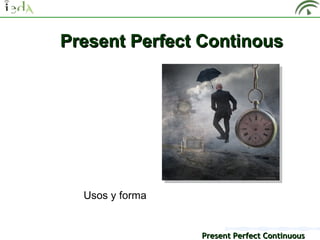
Present perfect continuous
- 1. Present Perfect Continous Usos y forma Present Perfect Continuous
- 2. Forma [has/have+ been+ participio de presente o “-ing”] Ejemplos: You have been waiting for two hours. Have you been waiting for two hours? You haven’t been waiting for two hours. Present Perfect Continuous
- 3. Frases negativas Sujeto Verbo auxiliar V-ing I, we, you, they haven’t been walking, doing,studying He, she, it has n’t been walking, doing, sudying • They haven’t been talking for two hours (Han estado hablando durante dos horas) • She hasn’t been sudying German since she was 16 (Ha estado estudiando alemán desde que tenía 16 años) Present Perfect Continuous
- 4. Frases afirmativas Sujeto Verbo auxiliar V-ing I, we, you, they have been walking, doing,studying He, she, it has been walking, doing, sudying • They have been talking for two hours (Han estado hablando durante dos horas) • She has been sudying German since she was 16 (Ha estado estudiando alemán desde que tenía 16 años) Present Perfect Continuous
- 5. Frases interrogativas Verbo auxiliar Sujeto “been” V-ing ? Have I, we, you they been walking, doing,studying Has He, she, it been walking, doing, sudying • Have they been talking for two hours? (¿Han estado hablando durante dos horas?) • Has she been sudying German since she was 16? (¿Ha estado estudiando alemán desde que tenía 16 años?) Present Perfect Continuous
- 6. Usos • Usamos este tiempo cuando queremos expresar el sentido de la continuidad de una acción que comenzó en el pasado y que dura todavía en el presente o acaba de terminar. • Nos referimos a algo que hemos estado haciendo durante un tiempo y, por tanto, usamos las preposiciones “for” y “since”. •Si usamos el presente perfecto continuo sin un periodo de tiempo, significa “lately” o “recently” (últimamente, recientemente). Present Perfect Continuous